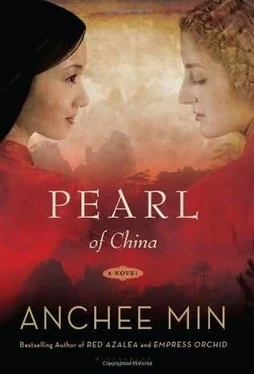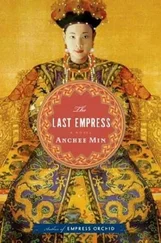Rouge and I tried to keep our perspective. We saw that ours was not the only family that suffered. Millions of others shared the same fate. By the end of 1969, the Cultural Revolution was showing itself to be one of the most destructive episodes in China’s long history.
After serving five years in the labor prison I was ordered to go back to where I came from, Chin-kiang. It was considered a continuing punishment. I was ordered to reform through physical labor as long as I lived. I was nearly eighty years old.
Rouge was given the option to stay where she was or come with me. She chose the latter and quit her job. She said that she had barely been earning enough to eat anyway.
We went home on a slow train. My skin was sun-beaten and my back was in constant pain. I couldn’t walk straight. I had injuries to my joints, spinal cord, and legs. But my spirit had not been crushed. I was proud of myself for paying the price for decency-I could honestly say that I had never betrayed God, and that God had never abandoned me.
Dick was given no option but to remain at Mao’s side in Beijing. For fifteen years Dick had been China’s chief propaganda director. He was the ghostwriter for both Mao’s and Madame Mao’s speeches and articles. When he begged for my release so I could join him, Madame Mao answered, quoting her husband’s poem, “Enjoy the beauty of snow while feeling no pity for the flies that freeze.”
I thought Dick had suffered from my absence and had been waiting for me. But I was wrong. One year after I was sent to the labor prison, the party provided him with a young woman one third his age to be his secretary and nurse. In the beginning, Dick was unaware of the trap that had been set for him. By the time he figured it out, he had fallen in love.
Summer in Chin-kiang was hot and humid, like living in a steam bath. Papa came to pick us up at the Chin-kiang station. We hadn’t seen each other for many years. It was amazing that Papa was still alive. He had shrunk in size and was bald and stooped. Our tears fell when we embraced. Rouge was excited to see her grandfather, although she barely knew him.
“I have lost track of your age, Grandpa,” Rouge said. “How old are you exactly?”
“Twenty-nine!” Papa said.
“You must mean ninety-two,” Rouge said.
“You got the joke! Yes, but actually I’m even older,” Papa said, straightening his back to look taller.
“But you do look like twenty-nine!” Rouge said.
“I do?” Papa was pleased. “I feel like twenty-nine, too.”
“I don’t remember your being this short,” I said. “Four feet?”
“I used to be double the height,” replied Papa.
“What made you shrink?” Rouge asked.
“My body knew how to conserve when times were hard.”
Rouge laughed. “I can’t imagine myself shrinking like you.”
“Thirty years in the river east, and then the next thirty years in the river west,” Papa said, reciting Confucius.
“What does that mean?” Rouge asked.
“In the concept of feng shui, it means that there are equal opportunities in the circle of life.”
“What is the secret of your longevity, Grandpa?” Rouge asked.
Papa smiled and whispered, “Having faith.”
“In Buddha?” Rouge teased.
“How dare you forget who I am?” Papa pretended to be upset, but not very convincingly.
“What will our living arrangements be, Papa?” I changed the subject. “Where are we to stay?”
“In the church,” Papa said.
“The Chin-kiang church?”
“Yes, Absalom’s Chin-kiang church.”
“But the Chin-kiang church was not built for people to live in…” I immediately realized the silliness of my statement. Living conditions in China had deteriorated so much that people had turned animal barns into living quarters.
“To many people, it is no longer a church,” Papa explained. “It was the headquarters of the Nationalist troops during the war against Japan. When the Japanese took over, it became a barracks. After the 1949 Liberation, the Communists repossessed it. It has been put into different uses ever since. First it was a military headquarters, and then a utility storage for the new government. During Mao’s People’s Commune movement, it was a public cafeteria. After the communes failed, it was turned into a shelter for the homeless. At the beginning of the Cultural Revolution, Red Guards from outside the province took over. They broke my stained-glass windows and painted Mao’s picture over every image of Jesus on every wall. They climbed the roof and knocked down the cross.”
“Are there families living inside now?” I asked.
Papa nodded.
“How many?”
Papa stuck up two of his fingers.
“Two?” Rouge guessed.
“Twenty.”
“Twenty families?”
“Yes, twenty families, one hundred and nine people.”
“How can anybody manage?”
“Oh, we manage, like caged pigeons.”
Memories of Absalom and Carie rushed up at the sight of the Chin-kiang church. I had to stop for a moment to collect myself. The gray structure had faded, but the building looked sound. The stone steps at the entrance were so worn they looked polished.
Although Papa had warned me about the crowded space, I was still shocked when I stepped into the church. I was prepared to see a pigeon cage, but what was in front of me looked like a beehive. There were no windows except those high up near the ceiling where the stained glass had been. These were the only light source for the entire interior. From floor to ceiling, the walls of the church had been divided into wooden, man-sized boxes, like giant wall-to-wall bookshelves, for people to sleep in. One could only lie down inside. To get into the boxes, people used a tangle of rope ladders. Young people and children occupied the top levels, while the old lived on the lower levels. Every inch of space was put to good use. The washing area was dominated by a large sink made from a water pipe about twenty feet long and split open at the top. Ten faucets poured weak streams of water. Below the sink was a slanted open gutter covered by a metal grate. Plumbing pipes and a dragonlike aluminum chimney were suspended in the air by wires. A loft had been built right under the ceiling as a shared storage space. Where the rows of church benches used to be was now a communal dining area. A large wooden table was surrounded by crooked benches. The raised stage where the altar had been was now a kitchen. There was split firewood piled high against the back wall. Baskets of coal spilled their contents. Wooden frames held buckets, pans, and woks. The podium where Absalom had preached now housed a stove. Behind the stage there was a room in which chamber pots were divided by curtains.
“What do you think?” Papa asked.
“Well, what ingenuity!” Rouge remarked.
Trying to ignore the terrible odor from the chamber pot area, I told Papa that I was impressed.
“No windows and it is so hot!” Rouge wiped sweat off her face. Her shirt was drenched.
“Welcome home,” Papa said.
Rouge and I were given one of the larger sleeping boxes. Rouge tried to slide into the narrow space and bumped her head.
Before we had a chance to unpack, the sound of knocking erupted. Papa went to open the door. A group of people rushed in. The men were bare-chested and the women wore thin shirts. They all had wooden slippers on their feet. They called my name excitedly.
“Don’t tell me that you don’t remember me!” said a wrinkled, hunchbacked old lady who grabbed me by the shoulders.
“Lilac?”
“Yes, I am. Are you Willow?” she cried. “How you have aged! Your hair is gray and white! Is this really you? Where have you been? Where is Pearl?”
Читать дальше












